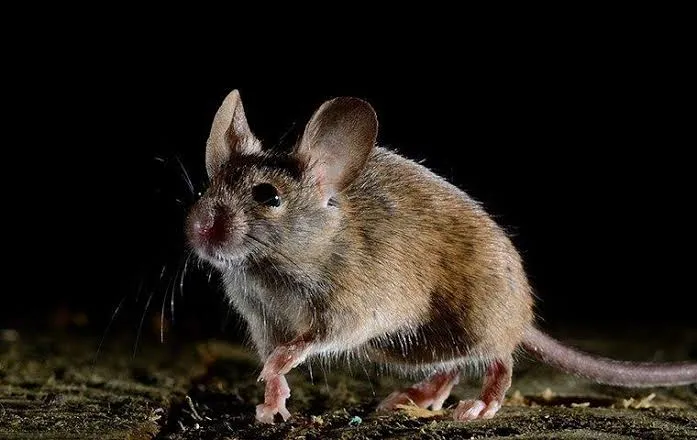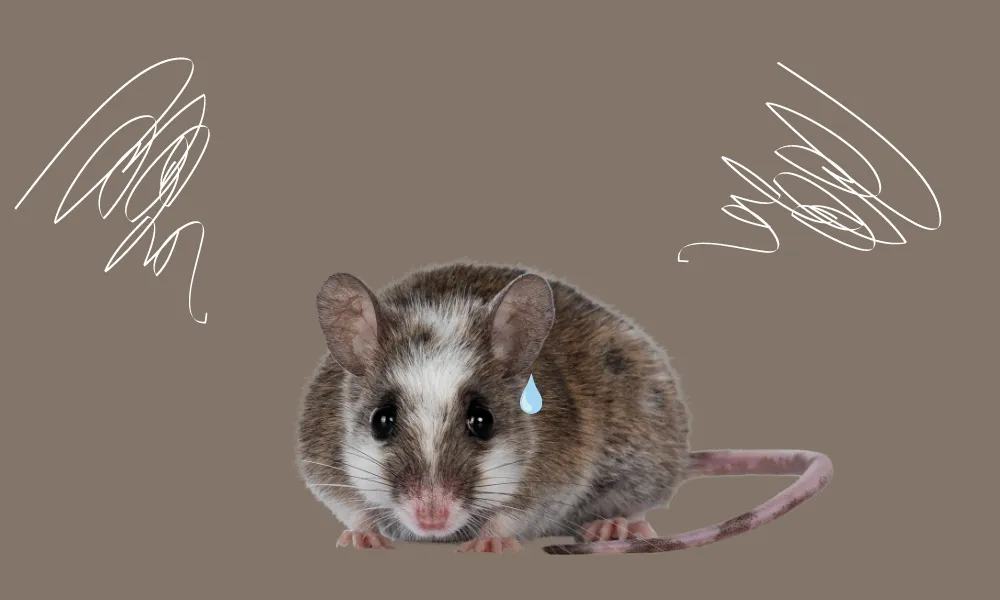Even though they are one of the smartest animals in the rodent family, mice can also get scared. This is because they are usually anxious.
In this article, I will discuss the reasons & common signs of a scared mouse. I will also provide some tips on how you can calm your pet mouse.
Let’s dive in!
Table of Contents
Do Mice Jump When They Get Scared?

Yes, mice jump when they get scared.
They are fast and wonderful jumpers, climbers, runners, and also swimmers.
When they are afraid, they can jump up to 13 inches high or climb bumpy surfaces!
Mice are quick in their response when they are scared. They jump up with their four legs and run out straight immediately.
And while moving, they carry their tail up to maintain their balance.
What Are Mice Scared Of?
Mice are mostly scared of their predators (Humans, Dogs, Cats & Rats).
They are also afraid of bright light, loud sounds, and distress noise. Let’s discuss each of them
Human
Even though mice build nests and settle in human houses, they are very scared of them.
This is true because mice see people as potential threats.
They always think humans are ready to harm them anytime they come out from their hiding place.
Thus, they stay away from human contact even while they are living with them. This explains why mice bites are hardly heard of.
Dog
Although dogs rarely eat mice, mice are always startled by their presence.
Mice see dogs as big predators even though dogs will avoid eating them due to the infectious diseases that they carry.
Cat
According to general belief, cats frighten small rodents like rats and mice.
And being good hunters of mice, these small creatures normally hide from them.
Owing to mice’s strong sense of smell, the protein in cats’ urine and sweat scares them away.
So, having even a little cat in your home as a pet is a good way to keep mice away.
Rat
Rats are older cousins to mice.
Mice are known to be afraid of them. This is because rates can kill mice easily.
Just the same way mice can smell the protein in a cat’s sweat and urine, they can smell that of rats.
And this usually scares and makes them terrified. Hence, mice hate seeing rats.
Bright Light
Mice are nocturnal animals.
In addition, they find nights a convenient time to search for food.
They have poor eye vision, therefore they become afraid when there are sudden bright lights around them.
This is true for indoor mice which are not used to a lighted environment.
All they do is build a nest in the dark and secluded regions of the house. Places like cracks, holes, and crannies.
Loud Sounds
The mice’s hearing capacity is high and exceeds that of humans.
This makes them sensitive to their environment and would always avoid areas with loud sounds.
Manufacturers have created ultrasonic repellents to scare mice away, but over time, these mice get accustomed to the sound and do not see it as a danger again.
Distress Noise
Just like many animals, mice communicate vocally, even in their times of distress.
The call for help from one mouse can scare the other mice in that place.
Therefore, records of mouse distress noise will always scare mice and make them feel uneasy.
Although over time they get used to it and not be afraid anymore.
Signs That Your Mouse Is Scared
When mice are scared, they display 3 different behaviors. This actually serves as their defensive mechanism against their threat.
These include:
- Freezing
- Impulse attack
- Running away from the environment
According to researchers, these behaviors are a result of the interaction between the 3 parts of the brain (the amygdala, ventrolateral periaqueductal gray region, and magnocellular nucleus).
But the level of fear that your mouse shows depends on the threat it faces and the access to the escape path.
Are Mice Scared Of Human Scent?
Yes, mice are scared of human scent.
Considering their excellent sense of smell, they can perceive a human scent and avoid traps they set for them.
In reality, mice are ignorant of traps humans often set for them, thanks to their poor sight.
But once they recognize the smell of a human that they commonly hate, they stay away from that area.
What Smells Are Mice Afraid Of?
Mice can sniff out food sources and construct a wide nest right in your home.
Although the most essential method of keeping them away is to maintain a clean house, seal off penetrating holes, and cover containers used for food storage.
But there are other repelling smells that mice are naturally scared of and you can use them to keep these home invaders far from your residence.
They include Peppermint oil, cloves, and cayenne pepper.
Peppermint Oil
Most mice can’t stand the smell of Peppermint oil due to its strong smell.
It is an excellent mouse-repellent because of its high alcohol concentration.
Note:
Mice can get used to it and not be afraid anymore.
Cloves/Cloves Oil
Mice cannot stand the smell of cloves and clove oil because they are their natural repellent.
When they smell it, they quickly run away from the area and avoid going there again.
To scare away mice, just place a few cotton balls that you’ve soaked in cloves or clove oil in their hideout then watch them run away.
Cayenne Pepper
Cayenne pepper is not just a spice for our food, it is also good at chasing away mice.
The strong smell often gets mice afraid. Spray some of this spice in areas where you think they are hiding.
Cinnamon
This is another smell that mice are very much afraid of. They hate to cross areas where they’ve sensed this powerful aroma.
Sprinkle some of this cinnamon spray in your cupboard, sofa, close to or any other place mice might be found in your home.
The Ideal Environment For Your Mouse
Your mouse requires a safe, and predator-free house where they can be comfortable. It has to be calm, clean, dry, and free from any sought of disturbance.
Here’s a perfect setup for your pet house.
Find a Well-spaced Environment
While building your pet house, make sure there’s enough space for mice to move around, dominate their surroundings, and behave like they would in the wild.
Ensure that their cage is well covered so that they would not escape. Mice are used to and capable of running through tiny spaces.
It Should be Properly Ventilated & Out Of Direct Sunlight
Mice love a properly ventilated environment where they don’t have to struggle with breathing or high humidity.
They are quick to respond to the effects of heat, hence a poorly ventilated pet house can lead to health problems.
Additionally, site your pet house out of the reach of direct sunlight. Your mice can cope with natural daylight but not bright lights.
It Should be Sound-Resistant
Mice are hyper-responsive to sounds. They can hear higher-pitched tones than humans.
Therefore, build their cage in a quiet and calm environment where there are no loud noises or ultrasounds.
Use Good Nesting Material
Mice are good at building next, so use quality material for their next to help them stay warm in cold weather.
They fall on their bedding from time to time to draw up moisture from their urine and feces.
Consequently, you should not use cotton wool or other fluffy material to make mice’s bedding.
This is not for any other reason but because the materials are not healthy for mice to eat and they sometimes get entangled in them while playing.
Buy Them Playing Toys and Build Hideouts
Naturally, mice are always hunted by animals bigger than them (They are prey species).
So, when you are constructing a house for your prey, make room for their hideout, and also find things to keep them busy.
You can buy them toys or solid running wheels but don’t limit it to these mentioned.
Construct Toilet Areas
Mice are scent sensitive, therefore they communicate with each other by marking scent (urine & secretion from their glands).
Building toilet areas or placing certain objects that help them mark scent makes them more comfortable. Not just that, it also makes your daily cleaning stress free.
Related Questions
Are Mice Scared Of Cats?
Yes, mice are scared of cats.
Information from scholars has proven that cats produce a chemical signal that makes mice afraid.
This chemical is a protein called MUPs and is found mainly in cats’ saliva, sweat, or urine.
When mice perceive this protein from afar, they tend to stay clear of that environment to avoid being eaten
The MUPs act on the mice’s sensory organ known as the vomeronasal organ and then trigger fear.
This is a possible explanation for the argument “mice are animals with advanced receptors that can pick signals quickly”
Note:
Cats are not the ones that prevent mice from entering your home, mice are the ones that naturally see them as predators.
Are Mice Scared of Dogs?
Yes, mice are scared of dogs.
Just like cats, the protein in dogs’ urine makes mice stay far away from people’s houses.
But recent research by US scientists has confirmed that dogs are not a foolproof solution to mice invasion in a home.
This is because mice are becoming less afraid of dogs than they are of other predators like foxes, snakes, and cats.
According to US scientists, mice are constantly scared of anything bigger than them.
When their predators are not around, they fearlessly return to the area.
Having many pets, eg. Dogs, cats, or both will keep mice away for longer periods.
Are Mice Scared Of Light?
Yes, mice are scared of light. They are nocturnal animals who prefer hunting their food at night more than during the day
This is largely attributed to their fear of predators who can eat them when the day is bright. However, there are times that they go out during the day but they try to thread carefully.
Mice can see light up to 0.01 photopic lux, this makes them stay clear to avoid human confrontation.
Recap
In summary, mice jump and run away whenever they are scared.
They freeze and exhibit some attacking gestures to indicate they are afraid, then they will flee.
It is common for them to be scared of humans, cats, dogs, bright lights, loud sounds, etc.
But apart from these major predators, mice are afraid of certain smells like peppermint oil, cloves, cinnamon, and cayenne pepper.
So, any time you want to construct a good pet house for your mice, be sure that it is quiet, well-spaced, and ventilated with quality bedding.
Also, try to build it far from a direct source of light, as this will help keep your mice comfortable.
Do you want to know more about mice? Read our article Do Mice Live in Groups/Together?
